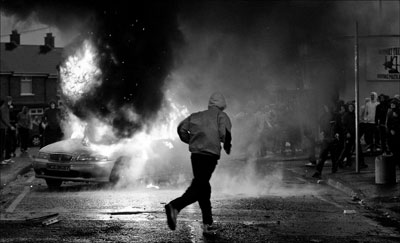Over 30 years of anarchist writing from Ireland listed under hundreds of topics
Peace process
Loyalist mob siege Belfast city hall after Sinn Fein snub army cadet
 There were angry scenes at Belfast city hall recently as the Sinn Fein Lord Mayor Niall Ó Donnghaile refused to present a Duke of Edinburgh award to an army cadet. The heated debate inside coincided with an angry loyalist mob outside who attacked cars outside claiming this was an attack on their community. It brought back memories of the sectarian cockpit of city hall politics of the 1980s.
There were angry scenes at Belfast city hall recently as the Sinn Fein Lord Mayor Niall Ó Donnghaile refused to present a Duke of Edinburgh award to an army cadet. The heated debate inside coincided with an angry loyalist mob outside who attacked cars outside claiming this was an attack on their community. It brought back memories of the sectarian cockpit of city hall politics of the 1980s.
Working-class communities left behind from peace process
Over 10 years on from the signing on the Good Friday Agreement and working-class communities in the North have failed to reap the rewards from the ‘peace dividend’ according to a new study conducted by the assembly’s Research and Library Service. The report which examined deprivation and social disadvantage since the 1998 agreement found that the proportion of people claiming benefits and unable to heat their homes had ‘increased’, poverty had remained ‘broadly unchanged’ and unemployment levels had began to ‘rise’.
Ardoyne Riots
 This summer’s Belfast riots must have been the most anticipated for some time, being widely predicted throughout politics and the media. The August rioting in Ardoyne (and Short Strand, the Markets, Lower Ormeau, New Lodge, Broadway; and Lurgan, Derry & Armagh) saw three days of trouble, shots fired at police and a landmine attack in South Armagh.
This summer’s Belfast riots must have been the most anticipated for some time, being widely predicted throughout politics and the media. The August rioting in Ardoyne (and Short Strand, the Markets, Lower Ormeau, New Lodge, Broadway; and Lurgan, Derry & Armagh) saw three days of trouble, shots fired at police and a landmine attack in South Armagh.
Consultative Group on the Past report - A Road Map to Peace?
The recent publishing of the report by the Consultative Group on the Past demonstrates the simmering sectarian tensions and hostility beneath the surface. The 190 page report by the group, chaired by ex-Church of Ireland primate Lord Eames and former Policing Board vice chairman Dennis Bradley marked 18 months of consultation with victim groups and others that have been bereaved through the conflict.
Stormont continues to crumble under its own contradictions!
 The Stormont administration is at a critical juncture, with the Executive not having met in several months. It seems an eternity since Paisley and McGuinness chuckled their way through meetings and joint events.
The Stormont administration is at a critical juncture, with the Executive not having met in several months. It seems an eternity since Paisley and McGuinness chuckled their way through meetings and joint events.
Northern Ireland's District Policing Partnerships
 Despite its retention of a heavy arsenal of lethal weapons including Tasers, and a litany of repressive anti-terror legislation including Diplock Courts, Hugh Orde, current Chief Constable of the Police Service of Northern Ireland often refers to the force as the ‘most democratic, accountable police service in the world’. This from the same Chief Constable who has recently unsuccessfully attempted to block the release of vital documents to the Pearse Jordon Inquest. Pearse, an unarmed IRA volunteer, was gunned down by the RUC on the Falls Road in 1992.
Despite its retention of a heavy arsenal of lethal weapons including Tasers, and a litany of repressive anti-terror legislation including Diplock Courts, Hugh Orde, current Chief Constable of the Police Service of Northern Ireland often refers to the force as the ‘most democratic, accountable police service in the world’. This from the same Chief Constable who has recently unsuccessfully attempted to block the release of vital documents to the Pearse Jordon Inquest. Pearse, an unarmed IRA volunteer, was gunned down by the RUC on the Falls Road in 1992.
The Irish Peace Process and the Working Class
The progress of the Irish Peace process has been both a long and turbulent one. It had seen the development in recent times of the once unimaginable, with Ian Paisley the leader of the DUP and Sinn Fein's Martin McGuiness sharing Power within the local administration. Since then, Paisley has stood down and Peter Robinson has taken over such leadership roles. No doubt in the years ahead many will attempt to pull the threads together of how such in it’s entirety had been moved to happen. Yet with now seeing such an administration up and running, has it delivered beneficial change for working class communities, and more importantly what change, if any, has there been for working class communities since the ending of the ‘war’.
10 Years on from the Good Friday Agreement
The war may be long over and our political rulers have finally decided to get it together but there has been no ceasefire in the class war against working-class people both locally and globally despite the promises of ‘prosperity’. With the onset of economic ‘recession’, continued decimation of our manufacturing industry and public services, increase in the cost of living (energy costs such as heating and electricity have risen by over 30% since 2006 never mind 1998), lack of affordable housing combined with the lowest wages in the UK and highest level of people on incapacity benefits in the UK, the wee ‘North’ isn’t a bed of roses that our rulers are keen to promote. Sectarian divisions institutionalised under the voting system at Stormont, and racist attacks are more evident and visible now more than ever as the ‘peace-walls’ have got higher and there are more of them.
The New Era in the North?
While Martin McGuinness was flying off to ‘sell’ the North to American investors with promises of low corporation tax, we are in the midst of wee bit of class war with classroom assistants and posties taking action to defend their interests against ‘the new era’ of the bosses. In the meantime, water charges are still coming through the backdoor by being added to our council rates despite the politicians’ promises made at the last election.
Sinn Fein Vote To Back PSNI
On Sunday Sinn Fein voted to support the Police Service of Northern Ireland at their extraordinary ard fheis which was attended by approximately 1,000 delegates. The vote, which was recorded by a show of hands, came after 6 hours of debate and a series of amendments which Sinn Fein claim will “enhance the proposal”. The build-up to the ard fheis saw an unprecedented amount of positive press for Sinn Fein with the media calling today’s event a “historical moment” and suggesting that the party has finally matured beyond it’s revolutionary past. A Sunday Business post poll stated that 56% of people questioned would be more likely to vote for the party if they support the PSNI.

